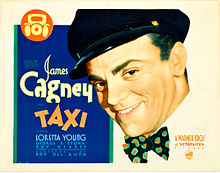Taxi!
| Taxi! | |
|---|---|
 lobby card | |
| Directed by | Roy Del Ruth |
| Written by | Adaptation & dialogue: Kubec Glasmon John Bright |
| Produced by | Robert Lord |
| Starring | James Cagney Loretta Young |
| Cinematography | James Van Trees |
| Edited by | James Gibbon |
Production company | |
| Distributed by | Warner Bros. |
Release date | January 23, 1932 |
Running time | 69 minutes |
| Country | United States |
| Language | English |
Taxi! is a 1932 American Pre-Code film starring James Cagney and Loretta Young. The movie was directed by Roy Del Ruth.
The film includes two famous Cagney dialogues, one of which features Cagney conducting a conversation with a passenger in Yiddish, and the other when Cagney is speaking to his brother's killer through a locked closet, "Come out and take it, you dirty yellow-bellied rat, or I'll give it to you through the door!." The provenance of this sequence led to Cagney being famously misquoted as saying, "You dirty rat, you killed my brother."
Also, Taxi! marks the first occasion when Cagney dances on screen, as Matt and Sue enter a Peabody contest at a nightclub. To play his competitor in a ballroom dance contest, Cagney recommended his pal, fellow tough-guy-dancer George Raft, who was uncredited in the film. In a lengthy and memorable sequence, he scene culminates with Raft and his partner winning the dance contest against Cagney and Young, after which Cagney slugs Raft and knocks him down.[1][2] As in The Public Enemy (1931), several scenes in Taxi! involved the use of live machine-gun bullets. After a few of the bullets narrowly missed Cagney's head, he outlawed the practice in his future films.[2]
In the film they see a fictitious Warner Bros. movie at the cinema called Her Hour of Love in which Cagney cracks a joke about the film's leading man's appearance (an unbilled cameo by Warners contract player Donald Cook, who had played Cagney's brother in The Public Enemy) saying, "his ears are too big". Also advertised in the cinema lobby in the film is The Mad Genius, an actual film starring John Barrymore which was released the previous year by Warners and is a plug by them.[3]
Plot
When a veteran cab driver, Pop Riley (Guy Kibbee), refuses to be pressured into surrendering his prime soliciting location outside a cafe, where his daughter works, the old man's cab is intentionally wrecked by a ruthless mob seeking to dominate the cab industry. Upon learning of the "accidental" destruction of his cab (and along with it his livelihood), the old man retrieves his handgun and shoots the bullying man known to be responsible, which lands him in prison, where he dies of poor health in fairly short order.
Pop's waitressing daughter, Sue (Loretta Young), is asked by a scrappy young cab driver, Matt (James Cagney), to lend moral support to a resistance movement populated by other drivers, who are also experiencing similar strong-arm tactics by the same aggressive group of thugs. However, after enduring the crushing loss of her father, Sue undergoes a complete ethical reversal about the notion of fighting back, feels thoroughly sickened by the violence and bloodshed, and she angrily tells the drivers as much.
Her unpredictably willful but passionate rant instantly lands her on Matt's bad side, although he eventually has a redemptive change of heart, then seeks to charm Sue into becoming his girlfriend. Other complications arise shortly thereafter, putting their loving relationship in jeopardy, which all too often tends to involve Matt's inability to control his own quick and fiery temper.
Cast
- James Cagney as Matt Nolan
- Loretta Young as Sue Riley Nolan
- George E. Stone as Skeets
- Guy Kibbee as Pop Riley
- Leila Bennett as Ruby
- Dorothy Burgess as Marie Costa
- David Landau as Buck Gerard
References
- ^ Everett Aaker, The Films of George Raft, McFarland & Company, 2013 p 20
- ^ a b Fristoe, Roger. "TCM's article on Taxi!". Turner Classic Movies. Retrieved 27 September 2015.
- ^ Nollen, Scott Allen (2008). Warners Wiseguys: All 112 Films That Robinson, Cagney and Bogart Made for the Studio. McFarland & Company Incorporated Pub. p. 43. ISBN 978-0-7864-3262-2.

